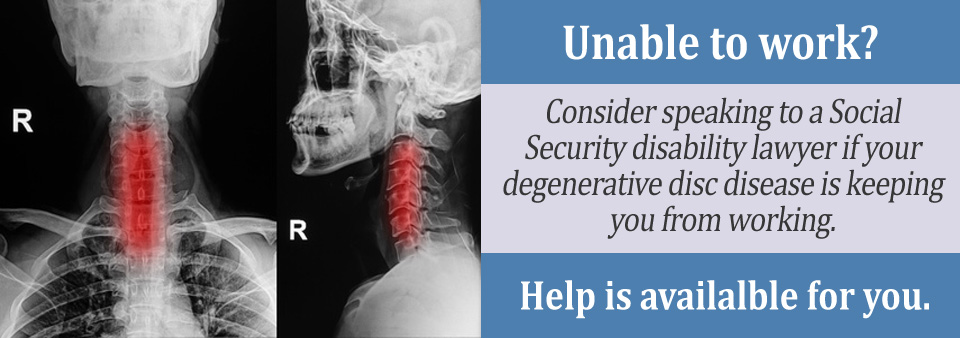If you have degenerative disc disease (DDD) and you have been told that your condition will keep you from working and earning a living for at least 12 months, you may qualify for disability benefits from the Social Security Administration (SSA). Here are five signs that you will be approved for disability.
Sign 1: You Meet the Non-Medical Requirements
To be covered by Social Security Disability Insurance (SSDI), you must have worked enough to pay in the necessary credits. For most workers this requires working the equivalent of 5 years full-time during the last 10 years, but that total may vary. Call the SSA to determine if you have enough credits.
Sign 2: You Have Sufficient Medical Evidence
Most disability claims are denied during the initial review process because there is not enough medical evidence to convince the disability examiner that you are disabled. If you have enough medical proof, specifically hard medical evidence, you can significantly increase your chances of being approved for disability benefits.

Sign 3: You Are Unable to Work For At Least 12 Months
To be approved for disability benefits, your disabling condition must be expected to keep you from working for at least a year. You will need to provide supporting evidence that supports this claim and that shows the severity of your condition and how you are restricted or limited.
Sign 4: You Meet a Blue Book Listing
The SSA uses a medical guide, which is known as the Blue Book, to determine if a claimant qualifies for disability benefits per the SSA criteria. For a disability claim for DDD to meet the criteria of the Blue Book listing you must show that your condition causes at least one the following – nerve root compression, spinal arachnoiditis, or lumbar spinal stenosis.
If your DDD does not meet the criteria of the Blue Book listing, then you may still qualify through a medical vocational allowance. This approach takes your age, work history, educational background, and transferrable skills into consideration with our medical condition. Your physician must complete a residual functional capacity (RFC) form, which will detail what you can and cannot do and paint a clear picture for the disability examiner to determine if you are able to work, and if so, what kind of work you can do.
Sign 5: You are Working With a Disability Lawyer
Disability claimants who have legal representation are more likely to receive disability benefits because their claims are approved. A disability lawyer knows what evidence your claim needs for approval and will work to make sure you get all your documentation in order.
If you need additional documentation, your lawyer may know what tests your physician should order and include. If you are ready to apply for disability benefits because of DDD, you should enlist the help of a Social Security Disability attorney. Fill out the Free Case Evaluation to get in touch with a participating lawyer in our network today!
Additional Resources
- Signs That You Will Be Approved for Disability
- Medical Criteria for Degenerative Disc Disease
- Tips on Applying for Disability with Degenerative Disc Disease
- Permanent Restrictions After Degenerative Disc Disease
- Using an RFC When Applying For Benefits With Degenerative Disc Disease